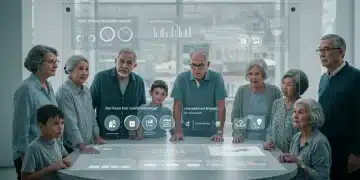Medicare preventive services utilization climbs: what you need to know

Medicare preventive services utilization climbs as more seniors engage in health screenings, vaccinations, and wellness visits, leading to improved health outcomes and cost savings.
Medicare preventive services utilization climbs as more seniors recognize the importance of these essential health checks. Have you wondered how these services can enhance your well-being? Let’s dive into the details and explore their increasing relevance.
Understanding Medicare preventive services
Understanding Medicare preventive services is essential for seniors. These services play a vital role in maintaining health and detecting issues early. The focus is on prevention rather than treatment, which can lead to better health outcomes. Knowing about these services can empower you to take charge of your health.
What are Medicare preventive services?
Medicare preventive services include various health screenings, annual wellness visits, and vaccinations. These services aim to identify potential health issues before they escalate. For example, routine screenings for cancer can catch diseases in their earliest stages when treatment is often more effective.
Key types of preventive services
- Screenings for chronic diseases like diabetes and hypertension
- Vaccinations such as flu shots and pneumonia vaccines
- Annual wellness visits to create personalized health plans
- Cancer screenings including mammograms and colonoscopies
Utilizing these services not only enhances your overall well-being but can also provide peace of mind. For many seniors, understanding the specifics of each service is crucial. Each preventive service is designed to address various health concerns that could arise as individuals age.
Moreover, you might be curious about the qualifications required for these services. Most preventive services are covered under Medicare Part B, meaning you don’t have to pay out-of-pocket for screenings that are deemed necessary. This financial support helps seniors access vital healthcare without hesitation.
Benefits of utilizing preventive services
Engaging with Medicare preventive services can lead to significant health benefits. First, regular check-ups can help detect conditions early, allowing more straightforward treatments. Second, preventive services can lead to lower healthcare costs over time by avoiding more serious health issues. Lastly, a proactive approach encourages a healthier lifestyle, which can be truly transformative.
In summary, understanding Medicare preventive services not only informs you about available options but encourages a proactive approach to your health. Taking advantage of these services means prioritizing your well-being and can lead to a brighter, healthier future.
Key statistics on service utilization growth
Understanding the key statistics on service utilization growth for Medicare preventive services is critical for seniors. Recent data shows a marked increase in the number of older adults taking advantage of these essential services. This trend highlights the growing awareness about health and wellness among seniors.
Growing trends in usage
In 2020, a significant number of seniors reported receiving at least one preventive service. Many of them participated in screenings that are vital for early detection of health issues. Increased access to information about these services has driven this growth.
Key figures to consider
- Over 50% of eligible Medicare beneficiaries utilized at least one preventive service in the last year.
- Annual wellness visits have increased by 35% since 2018.
- Vaccination rates for flu and pneumonia have shown a steady rise, reaching about 65% in recent studies.
- Cancer screenings, such as mammograms and colonoscopies, have grown in popularity, with participation rates up by 20%.
These statistics reflect a positive shift towards preventive care among older adults. As more seniors utilize these services, the overall health outcome for this population is likely to improve.
In recent years, public health campaigns and education programs have played a role in this increase. They have successfully communicated the importance of preventive services. As a result, more seniors are scheduling appointments and taking an active role in their health care.
Implications of utilization growth
The growth in service utilization has significant implications. Increased engagement means fewer chronic diseases in the long run. Plus, this trend can lead to better quality of life and more informed healthcare choices among seniors.
As understanding and awareness of preventive services evolve, it’s essential for seniors to continue seeking out these opportunities. Knowing the statistics behind this growth can inspire many to take advantage of the benefits these services offer.
Benefits of utilizing preventive services

The benefits of utilizing preventive services through Medicare are numerous and impactful. These services can lead to better health outcomes, early detection of diseases, and lower healthcare costs. Understanding these benefits can motivate seniors to engage more with their healthcare options.
Improved health outcomes
One of the primary advantages of preventive services is improved health outcomes. Regular screenings help identify health issues before they become severe. For instance, detecting high blood pressure early can prevent serious conditions like heart disease.
Early detection through screenings
- Routine screenings help catch diseases early.
- Preventive services can significantly increase survival rates, especially for cancers.
- Seniors can take advantage of screenings for diabetes and cholesterol.
- Beneficiaries typically report better health when engaging with these services.
Moreover, preventive care encourages individuals to adopt healthier lifestyles. When seniors participate in wellness visits, they often receive personalized health plans that promote balanced diets and regular exercise. This proactive approach can lead to long-term health benefits.
Cost savings in healthcare
Another essential benefit is the potential for cost savings. By utilizing preventive services, individuals can avoid expensive treatments resulting from untreated health issues. Preventive care often results in lower emergency room visits and hospitalizations.
Additionally, many preventive services are fully covered under Medicare, meaning no out-of-pocket expenses for seniors. This financial benefit encourages seniors to seek out these crucial health services without the burden of extra costs.
Engaging with Medicare preventive services not only impacts personal health but also contributes to a healthier community overall. The more seniors utilize these services, the better the community’s health, reducing the burden on healthcare systems.
Challenges faced in service access
While there are numerous benefits to using Medicare preventive services, seniors often face challenges in accessing these essential services. Understanding these barriers can help improve service delivery and encourage more seniors to take advantage of preventive care.
Common barriers to access
One major challenge is the lack of awareness about available services. Many seniors are unsure which preventive services are covered by Medicare. This confusion can lead to missed opportunities for vital health screenings and wellness visits. Additionally, some may not know how to schedule these services, further complicating access.
Transportation and mobility issues
- Transportation can be a significant barrier for many seniors.
- Some seniors may have difficulty getting to medical appointments or health fairs.
- Mobility issues can prevent individuals from seeking the care they need.
- Access to public transport may not be reliable in all areas.
Another obstacle seniors encounter is transportation and mobility issues. Many older adults struggle to reach healthcare facilities due to limited access to public transportation or difficulty driving themselves. This lack of mobility can discourage regular visits for preventive services, which are vital for maintaining health.
Economic factors
Economic factors also play a role in accessing preventive services. While many services are covered by Medicare, additional costs, like travel to appointments or co-pays for certain tests, can deter seniors from seeking care. Some may also prioritize basic necessities over healthcare, leading them to skip these important services.
Social support is another critical component in accessing preventive services. Many seniors may not have family or friends to help them navigate the healthcare system or accompany them to appointments. This lack of support can lead to isolation and decreased participation in preventive health programs.
Addressing these challenges requires a concerted effort from healthcare providers and the community to ensure that seniors are informed, supported, and able to access the preventive services they need. By understanding the barriers, we can work towards solutions that encourage greater participation in Medicare preventive services.
Future trends in Medicare preventive care
The future trends in Medicare preventive care indicate a shift towards more personalized and accessible healthcare for seniors. As technology advances, these services are expected to evolve, making it easier for older adults to engage with their health.
Increased use of technology
One significant trend is the growing incorporation of technology in preventive care. Telehealth services have gained popularity, allowing seniors to consult with healthcare providers remotely. This accessibility can encourage more frequent check-ups and follow-ups, leading to better health outcomes.
Personalized preventive services
- Preventive care will increasingly focus on individualized health plans.
- More emphasis will be placed on identifying specific risks based on genetic and lifestyle factors.
- Data analytics will help tailor preventive measures to suit individual needs.
- Wearable health technology can monitor conditions in real time.
Personalization in healthcare is another significant trend. As data collection improves, preventive services will be tailored to meet individual needs. Doctors will use health data to create more effective and personalized wellness plans. This approach can help target specific health risks unique to each senior, significantly enhancing care quality.
Focus on holistic health
A shift towards holistic health approaches is also likely. Medicare preventive care will encompass not just physical health but also mental and emotional well-being. Programs that promote mental health awareness and social engagement will become more integral to preventive care.
Furthermore, community-based initiatives are expected to grow. Local organizations and healthcare providers will collaborate to offer education and resources, helping seniors navigate the preventive care landscape more effectively. Empowering seniors within their communities can improve access and encourage utilization of available services.
The future of Medicare preventive care looks promising. As technology and personalized approaches continue to develop, seniors will have greater access to the services they need to maintain their health. These trends not only enhance healthcare delivery but also empower seniors to take a more active role in their health journeys.
In conclusion, understanding and utilizing Medicare preventive services is vital for seniors. By focusing on early detection and proactive health management, these services can lead to better health outcomes and reduced healthcare costs. Despite challenges such as accessibility and awareness, advancements in technology and community support are opening up new avenues for seniors to take charge of their health. Embracing these preventive services not only enhances personal well-being but also contributes to healthier communities overall. The future of Medicare preventive care looks promising, with innovations aimed at making healthcare more personalized, efficient, and accessible for all seniors.
\n\n\n
\n
\n
FAQ – Frequently Asked Questions about Medicare Preventive Services
What are Medicare preventive services?
Medicare preventive services are healthcare services that help detect health issues early, including screenings, vaccines, and wellness visits.
Why should seniors use preventive services?
Using preventive services can lead to early detection of diseases, improved health outcomes, and lower healthcare costs.
What challenges do seniors face in accessing these services?
Seniors often face barriers such as lack of awareness, transportation issues, and financial constraints that can hinder their access.
What trends are shaping the future of Medicare preventive care?
Future trends include increased use of technology, personalized care plans, and a focus on holistic health approaches for seniors.





